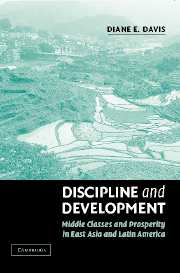Book contents
- Frontmatter
- Contents
- Preface
- DISCIPLINE AND DEVELOPMENT
- 1 An Introduction to Middle Classes, Discipline, and Development
- 2 Middle Classes and Development Theory
- 3 Discipline and Reward: Rural Middle Classes and the South Korean Development Miracle
- 4 Disciplinary Development as Rural Middle-Class Formation: Proletarianized Peasants and Farmer-Workers in Argentina and Taiwan
- 5 From Victors to Victims? Rural Middle Classes, Revolutionary Legacies, and the Unfulfilled Promise of Disciplinary Development in Mexico
- 6 Disciplinary Development in a New Millennium: The Global Context of Past Gains and Future Prospects
- Appendix A Cases, Comparisons, and a Note on Methodology and Sources
- Appendix B Defining the Middle Class: Notes on Boundaries and Epistemology
- Appendix C Tables
- Bibliography
- Index
3 - Discipline and Reward: Rural Middle Classes and the South Korean Development Miracle
Published online by Cambridge University Press: 31 July 2009
- Frontmatter
- Contents
- Preface
- DISCIPLINE AND DEVELOPMENT
- 1 An Introduction to Middle Classes, Discipline, and Development
- 2 Middle Classes and Development Theory
- 3 Discipline and Reward: Rural Middle Classes and the South Korean Development Miracle
- 4 Disciplinary Development as Rural Middle-Class Formation: Proletarianized Peasants and Farmer-Workers in Argentina and Taiwan
- 5 From Victors to Victims? Rural Middle Classes, Revolutionary Legacies, and the Unfulfilled Promise of Disciplinary Development in Mexico
- 6 Disciplinary Development in a New Millennium: The Global Context of Past Gains and Future Prospects
- Appendix A Cases, Comparisons, and a Note on Methodology and Sources
- Appendix B Defining the Middle Class: Notes on Boundaries and Epistemology
- Appendix C Tables
- Bibliography
- Index
Summary
The Present in Hindsight
Throughout the 1980s and much of the 1990s, South Korea earned its reputation as one of the darlings of the development jet set, a fabulously successful late developer committed to export-led industrialization and touted by policy makers and international aid agencies as a model for other developing countries. As the South Korean economic miracle captured scholarly attention, most analysts took as their analytic starting point that exact same era of unparalleled bounty in the 1980s, or at best the final years of the 1970s when significant gains first were apparent. Rather than looking to the pre-1970 period for clues as to which state or class forces were responsible for South Korea's buoyant economy in those later decades, the tendency was to cultivate a presentist understanding of the structure and nature of the South Korean economy during the period it reached its heights. This meant that certain actors and conditions – namely, those most visible and powerful by the late 1970s and into 1980s, such as the chaebols – were routinely identified as key sources of South Korea's success. Others, most notably for our purposes the middle classes, were routinely ignored.
But the economic and banking crisis that hit that country several decades later, in the 1990s, changed all that.
Information
- Type
- Chapter
- Information
- Discipline and DevelopmentMiddle Classes and Prosperity in East Asia and Latin America, pp. 64 - 157Publisher: Cambridge University PressPrint publication year: 2004
